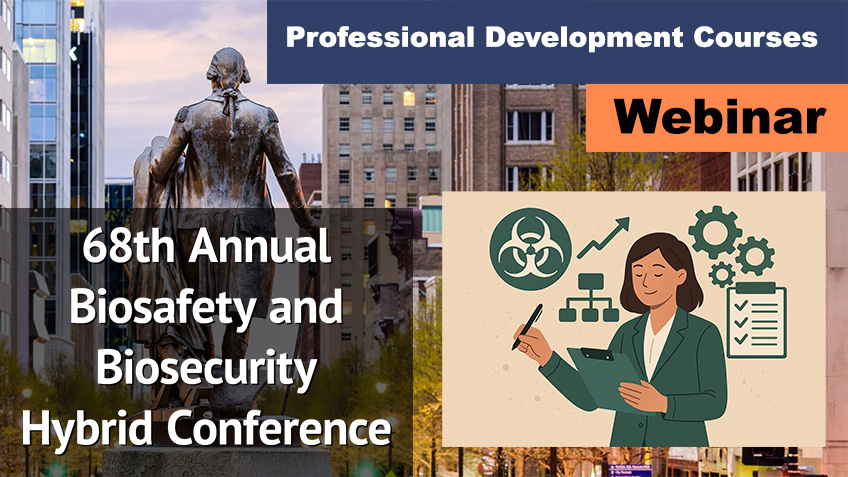Starts in:
Advanced Level Courses
For those with experience or looking for a challenging course.
In-person Professional Development Courses
All times listed are in MOUNTAIN STANDARD TIME
November 1-3, 2024
JW Marriott Phoenix Desert Ridge
Sunday, October 26, 2025, 8:00 AM – 12:00 PM
18. Flipping the Table: Effective Tabletop Exercise Design and Execution
Tabletop exercises (TTXs) are an essential part of a biosafety professional’s toolkit. It offers a safe, efficient way to “stress test” the resilience of an organization’s protocols in the face of hypothetical worse-case scenarios, making them particularly valuable for reinforcing staff training, enhancing coordination and communication between teams and team members, and identifying opportunities to improve plans and procedures. Additionally, TTXs can be used to help develop new processes and procedures in support of the stand up or expansion of activities, serving as a platform for identifying critical supporting processes and procedures that need to be in place for the activity to be completed effectively. The effectiveness of tabletop exercises (TTXs) in identifying areas for improvement can be undermined by poor planning, weak execution, and insufficient follow-up. In this course, attendees will develop an understanding of when and why they should consider conducting a TTX, participate in the development of a mock exercise, and propose appropriate follow-up actions to their exercise.
Objectives:
- Identify when, why, and what type of TTX would be useful to achieve a specific outcome
- Analyze the effort needed to design and conduct an effective TTX
- Describe appropriate follow-up actions to a TTX that ensure the continual improvement of the process or program test
Suggested Background: None
Target Audience: New Biosafety Professionals, All Safety Professionals
Audience Level: Basic
COURSE FACULTY
CONTACT HOURS
This course has been approved for 0.5 CM points toward RBP/CBSP recertification. ABSA International is approved as a provider of continuing education programs in the clinical laboratory sciences by the ASCLS P.A.C.E.® Program. This course is approved for 3.5 P.A.C.E.® contact hours.
Saturday, October 25, 2025, 8:00 AM – 12:00 PM
9. Nanoparticles in Modern Science—Understanding Hazards, Controls, and Safe Practices
Nanotechnology is revolutionizing many areas of modern life, offering innovative solutions across medicine, science, engineering, and technology. Nanoparticles (NPs), with their unique properties, are defined by composition, size, shape, and surface characteristics, hold significant promise in these fields. However, these same properties present challenges in recognizing, evaluating, and mitigating potential environmental, health, and safety risks associated with the production and application of nanoparticles. This course introduces the types, properties, production and synthesis of nanoparticles, focusing on their interactions with biological systems and associated chemicals, as well as potential implications of radiolabeled nanoparticles. This understanding is crucial for developing effective risk assessment and mitigation strategies for both in-vivo and in-vitro applications. It covers biosafety, biosecurity, and occupational health risks, emphasizing hazard identification, control measures, and knowledge gaps in nanotechnology. Through case studies and interactive exercises, attendees will explore best practices for safe handling, waste management, exposure assessment, and transport of nanoparticles. These hands-on activities will reinforce key concepts, fostering peer learning and collaboration.
Objectives:
- Identify common types of nanoparticles and their key properties
- Evaluate potential risks and safety concerns associated with the production and use of nanoparticles, including occupational exposure and environmental impacts.
- Develop and implement effective risk management strategies for laboratory projects involving nanoparticles, including hazard identification, exposure controls, and best practices for safe handling, waste disposal, and transport
Suggested Background: None
Target Audience: All Safety Professionals, Laboratory Workers, Animal Caretakers
Audience Level: Basic
COURSE FACULTY
CONTACT HOURS
This course has been approved for 0.5 CM points toward RBP/CBSP recertification. ABSA International is approved as a provider of continuing education programs in the clinical laboratory sciences by the ASCLS P.A.C.E.® Program. This course is approved for 3.5 P.A.C.E.® contact hours.
Virtual Professional Development Courses (webinars)
All times listed are in CENTRAL TIME ZONE
September 6 – October 25
These courses are part of the Professional Development Program for the 67th Annual Biosafety and Biosecurity Hybrid Conference. It is not necessary to be a conference participant to register for these courses.
Friday, September 19, 2025 | 11:00 am – 3:00 pm CDT
2V. Program Management Fundamentals for the Biosafety Professionals

This course is designed for biosafety professionals who are responsible for overseeing biosafety departments. The principles and practices briefly covered in this course are closely related to the Program Management Professional (PMP) certification. By understanding the core competencies of the PMP framework, biosafety professionals can apply project management methodologies to enhance the planning, execution, and evaluation of their biosafety programs. This integration of program management skills with biosafety expertise ensures that participants are well-prepared to lead effective, compliant and sustainable biosafety programs within their organizations. In addition, the course aligns with key international standards and guidelines, such as ISO 35001, which specifies requirements for a biosafety risk management system. Participants will gain insights into how to integrate ISO 35001 principles into their biosafety programs, ensuring a systematic and effective approach to biosafety risk management. The course also covers the World Health Organization (WHO) Biosafety Programme Management Associated Monograph, providing a global perspective on best practices for managing biosafety risks. By familiarizing themselves with the WHO guidelines, participants will be better equipped to implement and maintain robust biosafety programs that meet international standards.
What You’ll Learn
- Integration of Project Management Methodologies – Focus on planning, execution, and evaluation of biosafety initiatives using structured project management tools and techniques
- Implementation of ISO 35001 Standards – Emphasis on creating a systematic and effective approach to managing biosafety risks.
- Adoption of WHO Biosafety Programme Guidelines – Provides a global perspective and best practices for managing biosafety risks in compliance with international expectations
Objectives:
- Summarize program management principles and methodologies tailored specifically for biosafety applications
- Recognize skills needed to identify, assess, and mitigate management risks effectively
- Apply PMP, ISO 35001 and WHO applications to biosafety
Suggested Background: Fundamentals of Biosafety
Target Audience: New Biosafety Professionals, All Safety Professionals
Audience Level: Intermediate
Course Length: 4 hours (with a 15-minute break)
Questions
Please direct questions about this course to:
KariAnn DeServi, MEd
Director of Education, ABSA
866.425.1385 / education@absa.org
To receive the ABSA member rate, participants must be current ABSA members during the training year.
Course was one 4-hour session. Within 10 business days of purchasing the recording, you will be added to the course on the ABSA International Training Site. If you have already taken ABSA courses, then you will receive an enrollment notification. If you are a new user, you will receive an invitation to create your account on the ABSA International Training Site. Once the account is created, you will see the course on your course dashboard. You will have 60 days to complete the course.
COURSE FACULTY
COURSE FEES
ABSA Member: $300
Non-member: $390
To receive the ABSA member rate, participants must be current ABSA members during the training year. Fees include course handouts, access to the ABSA International training site, and 4 hours of expert-led interactive instruction.
CONTACT HOURS
This course has been approved for 0.5 CM points toward RBP/CBSP recertification. *ABSA International is approved as a provider of continuing education programs in clinical laboratory sciences by the ASCLS P.A.C.E.® Program. This course is approved for 3.5 P.A.C.E.® contact hours. Course access links are unique and for individual use only. Sharing is prohibited. Duplicate logins or unregistered attendees will be removed from the webinar without a refund.








